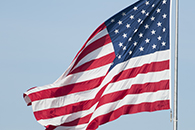Researcher says showing patriotism on July Fourth can be psychologically rewarding
Wednesday, June 26, 2013
MANHATTAN -- This Independence Day, it's not bad to feel good about being an American, a Kansas State University researcher said.
It is psychologically rewarding for people to affiliate themselves with a group, said Donald Saucier, associate professor of psychological sciences. He studies expressions of prejudice, which include aspects of group identity and in-group and out-of-group distinctions.
"The Fourth of July is important because it allows people to feel good about being an American," Saucier said. "This country was born on hard work and people wanting an ideal. It's OK to remember the people who came earlier and allowed us to lead the great American lives that we lead."
But he said that it is important not to promote ethnocentrism, which is the belief that a person's group or nationality is better than other groups. Ethnocentrism can lead to disparagement, degradation or even violence toward a group, he said.
"Be proud of being an American, just don't make the world a bad place for anyone else," Saucier said.
Patriotism is socialized, Saucier said, and some people are more patriotic than others because socialization processes affect people differently. If it was important for a person's parents to be patriotic, then that person also is likely to be patriotic. Patriotism also may increase if a person is connected to the military or if that person has immigrated to the U.S.
Patriotism also is celebrated through symbols -- such as the flag; the colors red, white and blue; Olympic uniforms; and the national anthem -- to express patriotic sentiment. A soldier attending a college class in fatigues or a student reciting the Pledge of Allegiance can be other symbols and ways to show patriotism.
"All of these are things that we can put on and brand our group," Saucier said. "It can create a cycle of patriotism. People are taught that the flag is good; they display the flag because it is good and then other people learn the flag is good."
Advancements in technology can affect patriotism because technology now provides Americans with more information about international affairs than they may have known in decades past. Media never shut down and news outlets help the world appear smaller, which can increase patriotic sentiments, Saucier said.
"What is happening is the salience of our membership in a group called Americans is probably greater now than it ever has been because the world is getting smaller," Saucier said. "This has really made the American identity stronger."
Saucier said American patriots tend to fall in one of two categories: blind patriots and constructive patriots.
A blind patriot sees the U.S. and anything that it does as automatically right, Saucier said. Blind patriots are more compliant and do not challenge the government. Constructive patriots initiate change when they see something happening and they do not agree with it.
Both patriots can celebrate the Fourth of July, Saucier said. Patriots can believe in the American ideal and show patriotism without supporting everything the country does. If a person does not agree with the government, then he or she can practice patriotism by participating in the democratic process, he said.
"Voting is one of the most patriotic acts that we can engage in because we are using one of the greatest rights that this country has given us, which is a legitimate voice in the construction of our leadership," Saucier said. "Sometimes people confuse blind obedience to the government with patriotism. What I hope on the Fourth of July is that people remember that we have rights as Americans and that using our rights is part of being an American."
Many of the principles on which the country was founded still provide much of the worldview that encompasses our patriotism today, Saucier said. Freedoms -- such as freedom of speech and freedom of religion -- are still an important part of patriotism and what it means to be an American.
"Very early on in this country's formation, we decided what it is to be an American and we have held pride in that for several hundred years," Saucier said. "Those are great ideals. Those are reasons that we are proud to be Americans."

